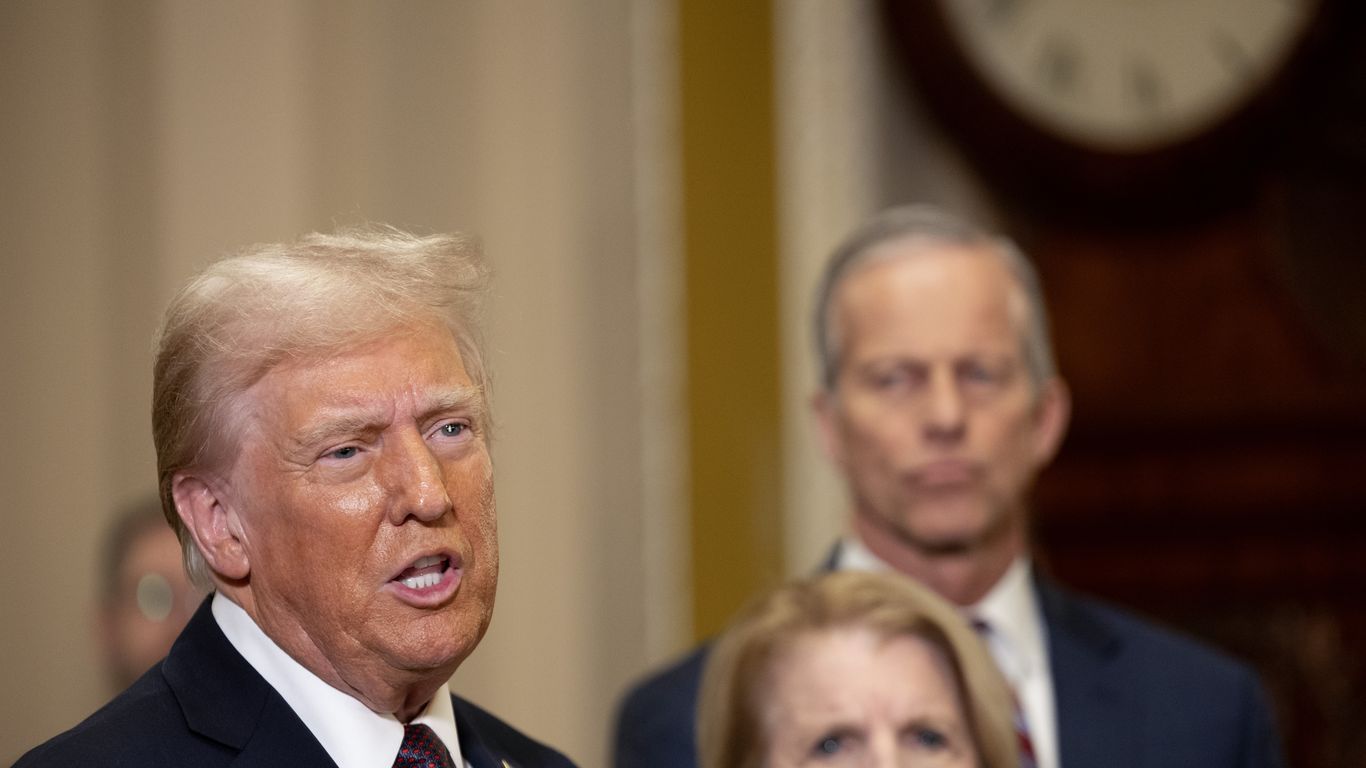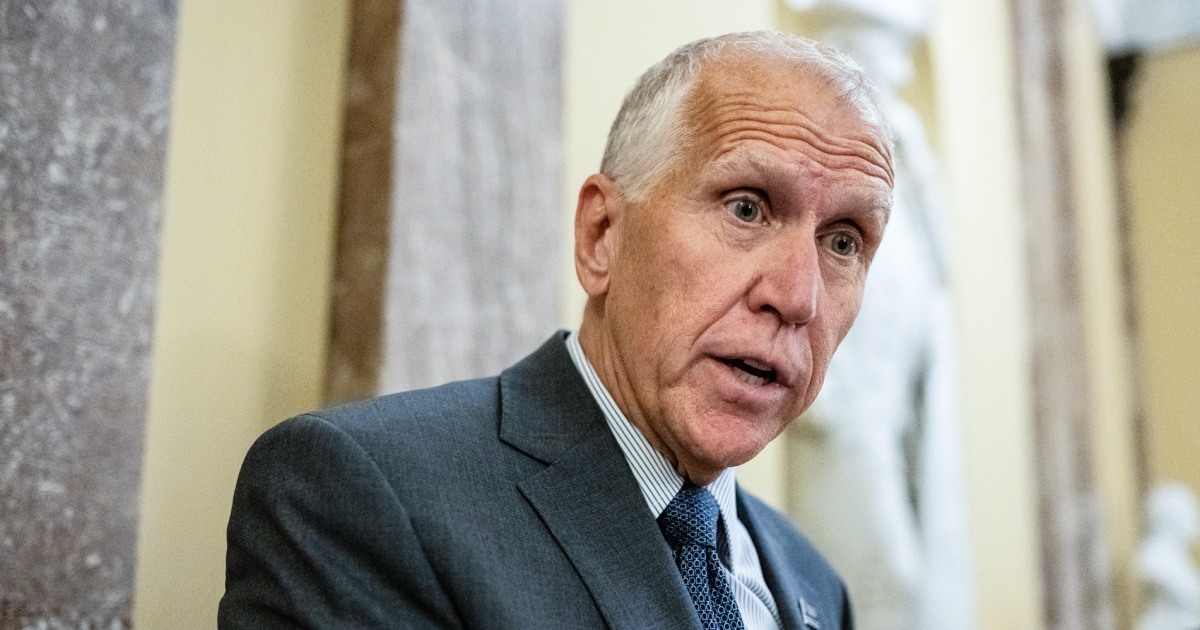Tension Rising among House Republicans Over Medicaid Cuts

Introduction
The tension is rising among House Republicans as they scramble to prevent the Senate from making cuts to Medicaid. On Monday afternoon, Speaker Mike Johnson is expected to hold a call with his colleagues to address this pressing issue.
Background
The Republican party has been facing internal divisions as they try to push President Trump's agenda forward. In the past, they have successfully nudged his tax bill towards passage. However, with the recent emergence of proposed cuts to Medicaid, tensions are running high and the party is facing a new challenge.
The Senate's version of the bill has been met with strong opposition from Democrats and even some Republicans. The proposed cuts to Medicaid have been a major point of contention, with many arguing that it will leave millions without access to essential healthcare services.
Current Scenario
As the battle lines are drawn, both sides are digging in their heels. The Senate's version of the bill would add a staggering $3.3 trillion in new debt, according to the Congressional Budget Office. This has caused concern among Republicans who are known for their fiscal conservatism.
In an effort to address these concerns and garner support for the bill, President Trump has been pressuring Senate Republicans to vote on the bill as soon as possible. He has even gone as far as to set a deadline for the bill to be on his desk before July 4th.
In addition to the proposed cuts to Medicaid, the bill also includes a controversial “current policy baseline” accounting tactic. This has caused even more division among Republicans and has become a major hurdle in getting the bill passed.
Conclusion
The fate of the Senate's version of the bill remains uncertain as both parties continue to debate and negotiate. With the tension and divisions within the Republican party, it is unclear if they will be able to push the bill through before the July 4th deadline. Only time will tell if the bill will be able to pass and if the proposed cuts to Medicaid will be included in the final version.
About the People Mentioned
Mike Johnson
Mike Johnson, born January 30, 1972, in Shreveport, Louisiana, is an American lawyer and Republican politician serving as the 56th Speaker of the U.S. House of Representatives since October 25, 2023. He represents Louisiana’s 4th congressional district, covering northwest and western regions of the state, including nearly 760,000 residents across approximately 16 to 20 parishes. Johnson was first elected to Congress in December 2016 by the largest margin of victory in his region in over 50 years and is currently serving his fifth term[1][2][3][4]. Before his tenure in Congress, Johnson earned a Juris Doctor from Louisiana State University’s Paul M. Hebert Law Center in 1998 and worked as an attorney, including with the conservative Christian legal group Alliance Defending Freedom. He also served in the Louisiana House of Representatives from 2015 to 2017. Johnson has been a prominent social conservative, advocating for policies such as nationwide abortion bans and opposing the expansion of medical cannabis. He chaired the Republican Study Committee from 2019 to 2021, the largest conservative caucus in Congress, and served as Vice Chairman of the House Republican Conference and Deputy Whip before becoming Speaker[1][2][4]. Johnson's rise to Speaker was notable for its speed; he attained the position faster than anyone since 1883. His speakership followed the ousting of Kevin McCarthy and has been characterized by efforts to promote conservative principles including limited government, individual freedom, fiscal responsibility, and support for military and veterans. In 2024, Johnson was reelected as Speaker for the 119th Congress. His leadership also focuses on growing the House Republican majority and advancing conservative legislative priorities[1][3][4][5]. He is married to Kelly Johnson, a licensed pastoral counselor and former teacher, and they have five children. The family resides in Bossier Parish, Louisiana[1].
Donald Trump
Donald John Trump, born June 14, 1946, in Queens, New York, is an American businessman, media personality, and politician. He graduated from the University of Pennsylvania’s Wharton School in 1968 with a degree in economics. In 1971, he took over his family’s real estate business, renaming it the Trump Organization, through which he expanded into building and managing skyscrapers, hotels, casinos, and golf courses. Trump gained widespread fame as the host of the reality TV show *The Apprentice* from 2004 to 2015, which helped establish his public persona as a successful entrepreneur. Trump entered politics as a Republican and was elected the 45th president of the United States, serving from 2017 to 2021. His presidency was marked by significant policy actions including tax cuts, deregulation, the appointment of three Supreme Court justices, renegotiation of trade agreements (notably replacing NAFTA with the USMCA), and a focus on immigration control including border wall expansion. He withdrew the U.S. from international agreements such as the Paris Climate Accord and the Iran nuclear deal, and engaged in a trade war with China. His administration’s response to the COVID-19 pandemic was criticized for downplaying the virus’s severity. Trump was impeached twice by the House of Representatives—first in 2019 for abuse of power and obstruction, and again in 2021 for incitement of insurrection—but was acquitted by the Senate both times. After losing the 2020 election to Joe Biden, Trump challenged the results, culminating in the January 6, 2021, Capitol riot. He remains a central figure in American politics, having won the 2024 presidential election and returned as the 47th president in 2025, continuing to promote policies aimed at economic growth, border security, and military strength[1][2][3][4].
About the Organizations Mentioned
House Republicans
The **House Republicans** refer to the Republican caucus within the United States House of Representatives, currently holding a slim majority in the 119th Congress beginning in 2025. This group functions as the primary organizational body for Republican members in the House, coordinating legislative strategy, party messaging, and leadership elections[4][9]. Historically, the House Republican Conference has been a major force shaping U.S. policy and governance since the party’s founding in the mid-19th century. It provides a platform for collective decision-making and policy development among Republicans in the House. The Speaker of the House, currently Mike Johnson (LA), is the most senior Republican leader and presides over House proceedings, sets the legislative agenda, and serves as the party’s chief spokesperson[2][4]. The Majority Leader (Steve Scalise), Majority Whip (Tom Emmer), and other leadership roles manage daily legislative operations, party discipline, and coordinate votes[4][5]. In terms of **key achievements**, House Republicans have historically influenced major legislation on taxation, deregulation, defense, and judicial appointments. Their agenda in 2025 focuses on reversing policies from the previous administration, emphasizing conservative priorities such as economic growth, national security, and limiting government intervention[7][6]. The current status of the House Republican majority is notably narrow, with just 219 seats out of 435, the smallest margin since 1931. This slim majority demands strong party unity and strategic negotiation to pass legislation and maintain control. Speaker Johnson’s election required every Republican vote except one, illustrating the fragile balance within the caucus[1][3][6]. The party’s leadership includes new and returning figures tasked with navigating this delicate legislative environment while working closely with the executive branch under President Donald Trump’s administration[5][7]. Notable aspects of the House Republicans include their tight internal cohesion, strategic focus on legislative priorities aligned with conservative principles, and their adaptation to a highly divided House, which impacts how they engage
Senate
The **United States Senate** includes several key committees critical to business and technology policy, notably the *Senate Committee on Small Business and Entrepreneurship* and the *Senate Committee on Commerce, Science, and Transportation*. These committees play pivotal roles in shaping legislation that impacts small businesses, innovation, technology development, and commerce nationwide. The **Senate Committee on Small Business and Entrepreneurship** advocates for small businesses by overseeing the Small Business Administration (SBA), which provides capital access, education, technical assistance, and federal contracting opportunities to small enterprises. This committee’s historical role has been to ensure the vitality of small businesses, which are essential to the American economy. Recent efforts include bipartisan reforms targeting SBA program efficiency, fraud prevention related to pandemic aid, and support for entrepreneurship in underserved communities. They also focus on programs like the Small Business Innovation Research (SBIR) and Small Business Technology Transfer (STTR), which connect federal agencies with private entrepreneurs to accelerate research and development in critical tech areas, thereby maintaining U.S. technological leadership[1][4][5][8]. The **Senate Committee on Commerce, Science, and Transportation** is one of the largest Senate committees, overseeing broad sectors including consumer protection, economic development, manufacturing, trade, science, and transportation infrastructure. It addresses emerging technologies, environmental issues like climate change, and space exploration, both government-funded and private. This committee significantly influences national business practices, product safety, competitiveness, and innovation ecosystems, affecting industries from maritime to digital technology[2][7]. Notable recent activities include Senate hearings on Big Tech antitrust and competition policies, emphasizing the need to regulate dominant technology firms to foster innovation and protect consumers and workers. This aligns with broader legislative efforts addressing artificial intelligence and technological competitiveness in 2025[6][10]. In summary, the Senate’s organizational structure and committees serve as crucial instruments in shaping U.S. business and technology landscapes. Through oversight, legislation, and reform initiatives, they support small businesses, promote innovation
Republican Party
The **Republican Party**, also known as the **GOP (Grand Old Party)**, is one of the two major political parties in the United States, founded in 1854 primarily by anti-slavery activists opposing the Kansas-Nebraska Act and the expansion of slavery into U.S. territories[1][5]. It was formed from a coalition of former Whigs, Democrats, and Free Soil party members who shared opposition to slavery and a desire for a national political force promoting economic development and social order[2][5]. The party's early base included northern Protestants, businessmen, factory workers, professionals, and prosperous farmers. It strongly supported pro-business policies like the national banking system, the gold standard, railroads, and high tariffs[1][3]. Abraham Lincoln, the first Republican president elected in 1860, led the party through the Civil War, championing the abolition of slavery and the preservation of the Union. This solidified the GOP’s dominance in national politics for decades, especially in the North, while it remained weak in the South[1][5][6]. Historically, the Republican Party was instrumental in major social reforms, including the Emancipation Proclamation and the passage of the 13th, 14th, and 15th Amendments, which abolished slavery, guaranteed equal protection, and secured voting rights for African Americans, respectively[6]. The party also supported women's suffrage early on, backing the 19th Amendment[6]. In the 20th century, Republicans were associated with both conservative economic policies—favoring reduced taxes, limited government regulation, and individual economic freedom—and a strong national defense[7]. The party experienced ideological splits, notably in 1912 when Theodore Roosevelt led a progressive faction away from the conservative wing[1][5]. Today, the GOP continues to promote conservative social policies and states’ rights, opposing extensive federal intervention and advocating free-market principles[7]. For readers interested in business and technology,
Congressional Budget Office
The **Congressional Budget Office (CBO)** is a nonpartisan federal agency established in 1974 by the Congressional Budget Act to support Congress in budget and economic policy matters. Its core mission is to provide objective, impartial, and professional economic and budgetary analysis to help lawmakers make informed decisions about fiscal policy. The CBO serves as an independent alternative to the executive branch’s Office of Management and Budget, ensuring Congress has its own reliable data and projections[1][2][3][7]. CBO’s primary responsibilities include producing formal cost estimates for nearly every bill approved by congressional committees and publishing key reports such as the annual *Budget and Economic Outlook*. This flagship report offers baseline budgetary and economic projections over a 10-year horizon, assuming current laws remain unchanged. The agency also conducts analyses of the economic impacts of proposed federal spending and tax policies, aiding Congress in understanding long-term fiscal effects and budget deficits[1][3][5]. Since its inception, the CBO has become a critical institution in the U.S. budget process, recognized for its rigorous methodology and nonpartisan stance. It employs experts in economics and public policy who draw on a wide range of data, forecasting models, and external expert advice to maintain accuracy and credibility. The agency has adapted to the digital age by enhancing its publication and digital media divisions to better communicate its findings to both legislators and the public[3]. Currently, the CBO continues to provide vital analysis amid complex economic conditions, such as assessing the federal deficit, tax revenue changes, and spending trends. It remains strictly neutral, never making policy recommendations, but offering transparent methodologies that underpin its analyses[5][7]. For stakeholders in business and technology news, the CBO’s work is essential for understanding how fiscal decisions may influence economic growth, innovation funding, and federal investment priorities.













